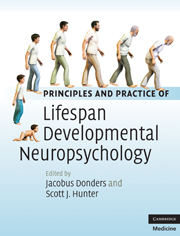Book contents
- Frontmatter
- Contents
- Contact information for authors
- Biography for Jacobus Donders and Scott J. Hunter
- Introduction
- Section I Theory and models
- Section II Disorders
- 5a Attention deficit hyperactivity disorder in children and adolescents
- 5b Attention deficit hyperactivity disorder in adults
- 5c Attention deficit hyperactivity disorder: a lifespan synthesis
- 6a Learning disorders in children and adolescents
- 6b Learning disorders in adults
- 6c Synthesis of chapters on learning disabilities: overview and additional perspectives
- 7a Infants and children with spina bifida
- 7b Adolescence and emerging adulthood in individuals with spina bifida: a developmental neuropsychological perspective
- 7c Spina bifida/myelomeningocele and hydrocephalus across the lifespan: a developmental synthesis
- 8 Cerebral palsy across the lifespan
- 9a Intellectual disability across the lifespan
- 9b Lifespan aspects of PDD/autism spectrum disorders (ASD)
- 9c Autism spectrum disorders and intellectual disability: common themes and points of divergence
- 10a Hearing loss across the lifespan: neuropsychological perspectives
- 10b Visual impairment across the lifespan: neuropsychological perspectives
- 11a Traumatic brain injury in childhood
- 11b Adult outcomes of pediatric traumatic brain injury
- 11c Neurobehavioral aspects of traumatic brain injury sustained in adulthood
- 11d Traumatic brain injury in older adults
- 11e Traumatic brain injury across the lifespan: a long-term developmental perspective
- 12a Pediatric aspects of epilepsy
- 12b A lifespan perspective of cognition in epilepsy
- 13a Leukemia and lymphoma across the lifespan
- 13b Lifespan aspects of brain tumors
- 14 Lifespan aspects of endocrine disorders
- 15 Metabolic and neurodegenerative disorders across the lifespan
- 16a Psychopathological conditions in children and adolescents
- 16b Psychopathological conditions in adults
- 16c Neuropsychological aspects of psychopathology across the lifespan: a synthesis
- Index
- Plate section
- References
9c - Autism spectrum disorders and intellectual disability: common themes and points of divergence
from Section II - Disorders
Published online by Cambridge University Press: 07 May 2010
- Frontmatter
- Contents
- Contact information for authors
- Biography for Jacobus Donders and Scott J. Hunter
- Introduction
- Section I Theory and models
- Section II Disorders
- 5a Attention deficit hyperactivity disorder in children and adolescents
- 5b Attention deficit hyperactivity disorder in adults
- 5c Attention deficit hyperactivity disorder: a lifespan synthesis
- 6a Learning disorders in children and adolescents
- 6b Learning disorders in adults
- 6c Synthesis of chapters on learning disabilities: overview and additional perspectives
- 7a Infants and children with spina bifida
- 7b Adolescence and emerging adulthood in individuals with spina bifida: a developmental neuropsychological perspective
- 7c Spina bifida/myelomeningocele and hydrocephalus across the lifespan: a developmental synthesis
- 8 Cerebral palsy across the lifespan
- 9a Intellectual disability across the lifespan
- 9b Lifespan aspects of PDD/autism spectrum disorders (ASD)
- 9c Autism spectrum disorders and intellectual disability: common themes and points of divergence
- 10a Hearing loss across the lifespan: neuropsychological perspectives
- 10b Visual impairment across the lifespan: neuropsychological perspectives
- 11a Traumatic brain injury in childhood
- 11b Adult outcomes of pediatric traumatic brain injury
- 11c Neurobehavioral aspects of traumatic brain injury sustained in adulthood
- 11d Traumatic brain injury in older adults
- 11e Traumatic brain injury across the lifespan: a long-term developmental perspective
- 12a Pediatric aspects of epilepsy
- 12b A lifespan perspective of cognition in epilepsy
- 13a Leukemia and lymphoma across the lifespan
- 13b Lifespan aspects of brain tumors
- 14 Lifespan aspects of endocrine disorders
- 15 Metabolic and neurodegenerative disorders across the lifespan
- 16a Psychopathological conditions in children and adolescents
- 16b Psychopathological conditions in adults
- 16c Neuropsychological aspects of psychopathology across the lifespan: a synthesis
- Index
- Plate section
- References
Summary
The preceding chapters by Wolf and Paterson and Klein-Tasman and Janke reveal similarities as well as differences between the related fields of intellectual disabilities and autistic spectrum disorders, and suggest distinct as well as overlapping areas for continued study. Both sets of authors note difficulties inherent in the fact that the disorders are defined by behavioral characteristics that have been subject to change over time. In the field of intellectual disability, confusion has been most marked in the debate over the statistical cut-off for the ID diagnosis, and over the role of adaptive skills in the conceptualization of the disability. In 1992, the American Association for Mental Retardation recommended changing the IQ cut-off from 70 to 75, a decision that would have doubled the number of individuals diagnosed with ID [1]. After a period of considerable debate, clinicians and researchers retained the cut-off score of 70 for both cognitive measures and adaptive skills. Klein-Tasman and Janke describe several caveats to this decision, including recognition of the psychometric limitations of IQ tests, and the danger of excessive reliance on overall scores and attendant disregard for evidence of variability in cognitive function. Similarly, despite dissenting opinions, deficits in adaptive functioning are now regarded as central to the diagnosis. Klein-Tasman and Janke note that this decision, while useful, introduces a variety of concerns, including questions about the validity of adaptive measures and the extent to which they reflect variance unique to adaptive functioning and distinct from cognitive ability.
Information
- Type
- Chapter
- Information
- Publisher: Cambridge University PressPrint publication year: 2010
